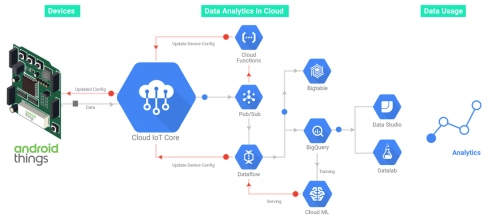
Google releases Android Things library for Google Cloud IoT Core
Google has released the Android Things client library designed to make it easier for Android Things users to utilize Google Cloud IoT core, the fully-managed service of Google Cloud Platform for connecting, managing and ingesting globally dispersed IoT data.
“The Cloud IoT Core client library was designed to enable Android Things developers to get started with just a few lines of code,” Wayne Piekarski, developer advocate for IoT with Android, wrote in the announcement. “The client library handles the networking, threading, and message handling, implementing best practices for authentication, security, error handling, and offline operation.”
The library is available as open source and available on GitHub for developers who prefer to build it themselves.
Tencent joins Linux Foundation as Platinum Member
During LinuxCon China yesterday, internet-based service provider Tencent announced that it has joined The Linux Foundation as a Platinum Member, affirming its commitment to open source, with Tencent’s Liu Xin, general manager of the Mobile Internet Group, joining the foundation’s board of directions.
“We are honored to be a Platinum member of The Linux Foundation. Open source is core to Tencent’s technical strategy,” Xin said in the announcement. “We look forward to strengthening our relationship with the international open source community and promoting innovation in cutting edge technology. As a first step, we are contributing our open source microservices project TARS, and open source name service project Tseer, to The Linux Foundation. In addition, we plan to contribute our open source AI project Angel to the LF Deep Learning Foundation. Together, we will help to build a welcoming and energized global open source ecosystem.”
The company, which offers some of China’s most-used internet services, like QQ, Qzone, Tencent Cloud and Weixin/WeChat, joins other Platinum Members of the Linux Foundation, AT&T, Cisco, Fujitsu, Hitachi, Huawei, IBM, Intel, Microsoft, NEC, Oracle, Qualcomm, Samsung and VMware.
Chinese-language versions of Linux Foundation Open Source Guides for the Enterprise released
Also announced yesterday during LinuxCon China, The Linux Foundation says that its 10 Open Source Guides for the Enterprise, developed in collaboration with TODO Group, have received Chinese translations.
“Chinese developers and organizations already contribute huge amounts of code to open source projects, and their engagement grows daily,” said Chris Aniszczyk, CTO of CNCF and co-founder of the TODO Group, in the announcement. “Making these resources available to Chinese audiences in their native language will encourage even greater adoption of and participation with open source projects.”
The guides cover a wide range of topics related to open source projects and development. They’re available from the Linux Foundation website and on the project’s GitHub.
Tact.ai raises $27M for AI voice recognition development
Tact.ai, developers of a conversational AI sales platform, announced its successful series C fundraiser of $27 million to be put towards development of human-friendly conversational AI for sales platforms. The new investments come courtesy of the Amazon Alexa Fund, Comcast Ventures and Salesforce Ventures.
“By leveraging AI running on edge devices, companies now have an opportunity to digitize human workflows and remove friction created by enterprise applications,” the company wrote in its announcement. “Tact.ai delivers a new system of workflow for sellers to remove friction from their day-to-day sales activities. With the AI-powered Tact Assistant, sellers can manage their deal flow and customer interactions in a more conversational way, just as naturally as playing songs using Alexa.”
This successful round of fundraising brings the company’s total funding to more than $57 million.
Fortanix extends runtime encryption to Python and R apps
Fortanix announced its Runtime Encryption Platform is adding Python and R capabilities to help developers and data scientists develop new techniques for analysis and machine learning. The Runtime Encryption Platform is designed to provide security and privacy for organizations with sensitive workloads.
“Runtime Encryption, using Intel SGX, delivers new levels of security for applications in the cloud, and protecting the confidentiality of sensitive data for AI apps is yet another exciting example,” said Ambuj Kumar, co-founder and CEO of Fortanix. “Runtime Encryption ensures confidentiality of data and secure execution enabling a new class of AI apps for healthcare, financial services and other sectors dealing with confidential information.”






